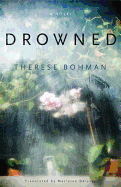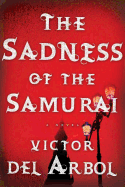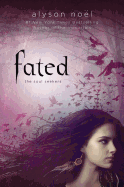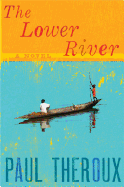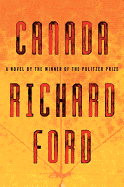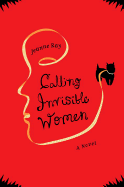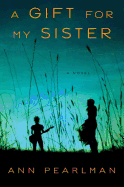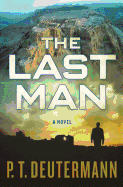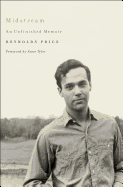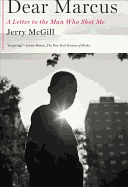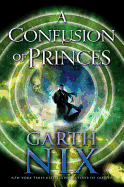Tuesday, May 29, 2012
You'll be hearing "Beat Generation" a lot this year as publicity wheels turn for the film version of Jack Kerouac's On the Road. One name that probably won't come up often, however, is 82-year-old "poet, bioregionalist, teacher" (as Iain Sinclair recently described him) Gary Snyder.
Although I read On the Road when I was 20, it was Kerouac's Dharma Bums that had a more profound impact. I was hooked by an early scene in which Ray Smith (Kerouac) visits his friend Japhy Ryder (Snyder) at a 12-by-12-foot Berkeley shack, which is filled with "typical Japhy appurtenances that showed his belief in the simple monastic life."
The Zen-inspired room is spare, excepting "a slew of orange crates all filled with beautiful scholarly books," including the complete works of D.T. Suzuki, a four-volume edition of Japanese haikus and "an immense collection of valuable general poetry.... if a thief should have broken in there the only things of real value were the books."
How could I resist? From that moment, I didn't want to be on the road; I wanted to be in that room, where a cup of tea was steaming "as he bent his serious head to the Chinese signs of the poet Han Shan."
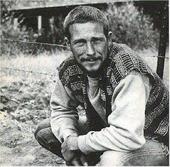 Kerouac may be a rite of passage when we're young, but Snyder and I are growing old together. My collection of his works is bookended by a copy of Riprap, & Cold Mountain Poems I bought in 1970 and a new edition of The Practice of the Wild, published by Counterpoint in 2010.
Kerouac may be a rite of passage when we're young, but Snyder and I are growing old together. My collection of his works is bookended by a copy of Riprap, & Cold Mountain Poems I bought in 1970 and a new edition of The Practice of the Wild, published by Counterpoint in 2010.
No Beat Generation writer has had more influence on me than Snyder, though I suspect he won't mind being neglected by On the Road's publicity machine this year. Read him. He's off the road, and worth the trip. --Robert Gray, contributing editor, Shelf Awareness
Drowned
by Therese Bohman, transl. by Marlaine Delargy
In her debut novel, Drowned, Therese Bowman offers something a little different from the crime fiction her Swedish compatriots have been producing with such success: it's never entirely clear whether this story involves a crime at all. However, the sense of chilly dread that suffuses this brief, psychologically intense novel approaches thriller levels in places.
Marina is a graduate student visiting her sister Stella and Stella's partner, Gabriel, in a small town during an unusually hot, sultry Swedish summer. She's supposed to be working on an art history assignment, but isn't getting much done; Gabriel, a novelist, is similarly struggling with his current work-in-progress. Stuck at the house together while Stella is at work at the town parks department, something seems to be happening between them, but they don't speak about it. There seem to be some things Stella won't speak about either, and the secrets weigh as heavily on the characters as the late-summer humidity. Marina's summer visit ends; the novel picks up several months later when she returns, after Stella has disappeared. In the short days of a cold, wet late autumn, Marina tries to sort out what happened to her sister... and what is still happening between her and Gabriel.
Drowned puts both its protagonist and its reader on edge almost from the beginning and never really allows either to become settled or comfortable. It's an effective, suspenseful psychological mystery that will add some provocative chills to the summer-reading list. --Florinda Pendley Vasquez, blogger at The 3 R's Blog: Reading, 'Riting, and Randomness
Discover: Summer heat and winter chill amplify the intensity of the relationships in a house full of secrets.
The Lower River
by Paul Theroux
When Paul Theroux (The Mosquito Coast ) was a Peace Corps volunteer in Malawi in the 1960s, he met a couple who invited him to visit their remote village. He went, only to realize that they wouldn't let him leave. Finally, a stranger happened by and helped him escape. The Lower River is a fictional variation on this premise.
Haberdasher Ellis Hock's wife gives him a smartphone for his 62nd birthday. On it, she finds that he has several e-mails from women, revealing a side of his life unknown to her. Things start to unravel; after fighting and counseling, they divorce.
Ellis moves to a condo. He recalls his years as a Peace Corps volunteer in Malawi, his Eden. Had his father not fallen ill and asked him to come home and run the store, he might never have left. He did worthwhile things while he was there: built a school, taught in it, started a clinic--and made a difference in the lives of the villagers.
Of course, Ellis decides to recapture his halcyon days. He arrives at the village, illusions and memories intact, but all is changed. After a week or so, he decides it's time to go home. At first, heat and inertia keep him there; soon, he realizes he is a prisoner. His attempts to escape are thwarted, malaria sets in, everyone lies--and that's just the beginning. Theroux has created a sad and bitter tale of innocence lost, a culture lost and nothing gained. --Valerie Ryan, Cannon Beach Book Company, Ore.
Discover: A staid American menswear store owner returns to Malawi, where he served in the Peace Corps four decades earlier, to find that all is lost.
Canada
by Richard Ford
Few books begin with such a powerful narrative hook as Richard Ford's Canada: "First, I'll tell about the robbery our parents committed. Then about the murders, which happened later." Dell Parsons and his twin sister, Berner, are settled into their lives in Great Falls, Mont., in the 1950s. But their father, a World War II veteran, has a core of restlessness that is about to tear their family apart. He is aided in this by his wife, the twins' mother, whose dissatisfaction with rural life ends up dovetailing with the anarchic dreams of her husband.
Despite its forceful opening, Canada is a densely introspective novel, as Dell traces the psychological and emotional consequences of his parents' actions.
The theme of boundaries resurfaces in the novel again and again: although the robbery has a cataclysmic effect on Dell's life, his parents did it for reasons that had nothing to do with him, with individual fates independent of his. Dell is more connected with his twin sister than any sibling could be, until she all but renounces her ties to him. There is the boundary between a normal childhood and a permanently traumatized one. And finally, Dell crosses the border from Montana into Saskatchewan, Canada, a physical boundary that represents his transition to a new life after his parents miserably fail to realize the American Dream.
One would think that Dell might find stability on the Canadian side of the border. As it turns out, though, once Dell reaches Canada, his troubles are just beginning. --Ilana Teitelbaum, book reviewer at the Huffington Post
Discover: When Dell Parsons's parents rob a bank together, he and his twin sister are thrown into a tailspin from which they never fully recover.
Calling Invisible Women
by Jeanne Ray
Every homemaker who feels she's taken for granted should open Calling Invisible Women and meet Clover Hobart, who looks in the bathroom mirror one day and realizes that not only does she feel invisible, she is invisible--her toothbrush is floating in the air. Clover's disappearances come and go without warning. While her best friend accepts her bizarre fate, it's disconcerting that Clover's preoccupied husband, her returned-to-the-nest son and her college-cheerleader daughter don't notice--going about their lives and talking to the phantom mom without seeing her.
Puzzling over her ephemeral existence, Clover notices a meeting announcement in the local newspaper: "Calling Invisible Women." Could there be others like her? At the Sheraton, she discovers a room of empty chairs. "We're all naked," explains a voice. So Clover joins the sorority.
We ache for Clover's confusion and cheer for her good humor and acceptance. Continuing to support her oblivious-but-lovable family, she learns to take advantage of being invisible and, together, she and her new friends determine the root of their condition: despite knowing its drugs can make women disappear, a pharmaceutical company has failed to withdraw them from the market. (Drug companies, take note: Hell hath no fury like an invisible woman.)
Fans of Jeanne Ray know that (as with her 2003 debut Julie and Romeo) we'll come to feel that we know Clover and sympathize with her plight. It's readers' good fortune that Ray brings her light, smart touch to this comic take on women of a certain age who feel they've disappeared. --Cheryl Krocker McKeon, bookseller
Discover: A comic tale of a middle-aged woman whose family doesn't notice her--even when she actually disappears.
A Gift for My Sister
by Ann Pearlman
Take two fatherless half-sisters. Make one an obedient, play-it-safe type; the other, a reckless, no-holds-barred rebel. Reinforce their differences by designating different typefaces to reflect the distinct voice of each sister as they narrate their story via alternating first-person chapters. What emerges is A Gift for My Sister, a moving, deeply resonant novel by Ann Pearlman (The Christmas Cookie Club).
The story begins with Sky, a happily married lawyer with a young daughter who resides in a California beachfront condo. Beyond her seemingly idyllic life, 30-something Sky is riddled with bitterness and worry incurred from a past marred by challenges and loss--the death of her father when she was a teenager, miscarriages and the passing of her best friend. Her younger sister, Tara, on the other hand, is a free spirit whose father abandoned her. In high school, she entered into an interracial romance with an ex-juvenile prison inmate and became pregnant. With beau and baby in tow, Tara took off to pursue her dreams of becoming a musician and is now on the verge of hip-hop superstardom.
When tragedy strikes, Sky and Tara are forced to reunite. By rendering shared experiences via their opposing personalities and viewpoints, Pearlman skillfully evokes empathy on both sides. Resentment, rivalry, fear of love and loss and the idea of forgiveness infuse what ultimately becomes a road-trip novel--from California to Michigan--where the sisters try to understand each other, the complications of their own lives and the larger ramifications of family. --Kathleen Gerard, blogger at Reading Between the Lines
Discover: Two disconnected sisters struggling to understand each other and the meaning of their lives.
Mystery & Thriller
The Sadness of the Samurai
by Victor Del Arbol, transl. by Mara Faye Lethem
Shifting from the early days of Francisco Franco's brutal dictatorship to the immediate aftermath of its end, Victor del Árbol's brooding The Sadness of the Samurai gently exploits the dark-wood-and-Catholic Gothicism of Spain's historical imagery. It also exposes the hell of revenge and unfinished business reverberating long after the advent of democratic reforms.
In 1941, aristocrat Isabel Mola is betrayed by her lover and then secretly assassinated when a plot to kill her fascist husband is revealed. A generation later, in 1981, police investigator Cesar Alcala viciously beats an interrogation subject. Young lawyer Maria thinks she is clearly representing the new spirit of democracy and openness when she prosecutes the investigator. But when Maria learns that Cesar was a desperate father trying to locate his abducted daughter, she finds a dangerous web of lies and abuses reaching back through the Franco years all the way to Isabel Mola's murder--involving both Maria's own family and forces in the government that are still in power.
Much like the dark, complicated conspiracy thrillers of the late Stieg Larsson, The Sadness of the Samurai depicts torture, murder and far-right political ideology playing out over generations of silence and treachery, and fans of Larsson's novels will recognize a familiar thrill as Maria races against time to save Marta Alcala--as well as her own soul. But, unlike the underground fascists in progressive Sweden Larsson hoped to out with his fictional work, del Árbol's characters give voice to victims of a state-sponsored brutality that operated with impunity for much of the 20th century. --Cherie Ann Parker, freelance journalist and book critic
Discover: A gothic thriller exploring the legacy of state-sponsored terror in Franco’s Spain.
The Last Man
by P.T. Deutermann
P.T. Deutermann opens his 13th novel, The Last Man, at Masada, the site of the legenday battle between the Roman legions and Jewish rebels holed up in Herod's ancient palace near the Dead Sea. The Jewish sicarii, or daggermen, stood ready to kill the women and children--and themselves--to protect the deep secrets and treasures of their faith, a moment vividly depicted in the brilliantly told prologue.
Jump to modern-day Israel, where recently widowed Judith Ressner is a brilliant archeologist buried in her studies and where David Hall, a whistle-blowing nuclear physicist, comes to Masada, ostensibly to indulge his rich-boy interest in the history of the place. His recently disappeared girlfriend, however, had a theory about Masada and the people who sacrificed themselves there, and Hall is there to find out if she was right.
Judith is assigned to be David's minder, and the two become grudging friends with an unspoken attraction. Hall finds the mysterious site his girlfriend hinted at, then gets caught wandering the mountain at night and is shipped off the site. He plays rich tourist again for many days, but soon heads back to Masada, scuba gear in hand. He calls Judith and asks her to join him; she angrily agrees and together they dive into the cistern Hall has discovered, looking for hidden areas they can only guess at, only to be sealed in by a mysterious adversary. There are conspiracies within conspiracies in Deutermann's intricate plot, and the two protagonists have discovered the heart of them all. --Rob LeFebvre, freelance writer and editor
Discover: The ancient secrets of a legendary battle site are revealed as an archeologist and a nuclear physicist work through their unspoken attraction.
Biography & Memoir
Midstream: An Unfinished Memoir
by Reynolds Price
When Reynolds Price died in January 2011, he had completed nearly two-thirds of a projected memoir that begins with his return to England in 1961 and ends in 1965. Price's brother William and one of Price's former Duke University students have turned that manuscript into Midstream. This sizable fragment is a witty and revealing peek into Price's life at a turning point in his prolific career.
During Price's mostly idyllic time at Oxford, he was preoccupied with the publication of his first novel, A Long and Happy Life. He lived and worked among a group of gay writers and academics that included W.H. Auden and Christopher Isherwood.
Price excels at brief, sharp glimpses of these literary giants and other luminaries and delightful cameo appearances of an assortment of celebrities. Price shared a lengthy, well-lubricated lunch with Elizabeth Taylor and Richard Burton while the two were filming Cleopatra in Rome. There's a meal with Leontyne Price, brief encounters with Eudora Welty and even Ronald Reagan, gazing at a store window in Beverly Hills one Christmas Day.
Midstream concludes with a moving portrait of Price's mother's final years, a period that marked his return to North Carolina, the purchase of his first house (he'd previously lived in a trailer) and the resumption of his teaching at Duke. In a warm introduction to this work, Anne Tyler, one of his first students, describes Price as "an exclamation point in a landscape of mostly declarative sentences." Reynolds Price, in this lively memoir, provides ample evidence to underscore that assessment. --Harvey Freedenberg, attorney and freelance reviewer
Discover: More than a mere fragment, this rewarding posthumous memoir covers a crucial period in the life of Reynolds Price.
Dear Marcus: A Letter to the Man Who Shot Me
by Jerry McGill
On January 1, 1982, a stray bullet struck 13-year-old Jerome McGill below the neck and left him a quadriplegic. Dear Marcus is a novel-length letter to his shooter--an angry, thoughtful and profound missive written in gritty and brave language by a man-boy searching for closure and a way to make sense of the injustice of his tragedy.
McGill replays the events leading up to his shooting, as well as the months spent in reconciliation and rehabilitation at the now-closed St. Vincent's Hospital in New York City, where he relearns skills he once took for granted. He could easily dwell on the negatives and sink into the brutal depths of despair; reflecting on the possibilities that were taken from him, he admits "they can eat you up slowly like bone cancer or a flesh-eating bacteria." Looking back to those months, though, he graciously accepts his fate, revealing a profound sympathy and empathy with "Marcus," McGill's nickname for his unknown shooter.
McGill presents the pivotal moments of his life with the clarity of a cinematographer's lens--as a result, his letter becomes confident, reassuring, even an offer of friendship to Marcus. In the end, McGill sees his life's trajectory as a spiritual calling, one which the events of January 1, 1982, sealed into place--and for which he now rejoices. --Nancy Powell, freelance writer
Discover: An angry, emotionally brutal letter written to an unknown assailant holds the power of healing and forgiveness for a young quadriplegic, turning tragedy into triumph.
House & Home
So Pretty! Crochet
by Amy Palanjian, illus. by Rae Ritchie
Crochet, like its sister craft knitting, is enjoying a resurgence thanks to the rise of craft blogs, online communities and artisan yarn companies. So Pretty! Crochet, a fresh, breezy set of patterns collected by editor and blogger Amy Palanjian, gives it an image makeover.
Celebrating crochet's mix of traditional roots and infinite possibilities for innovation, Palanjian gathers patterns from 12 designers, plus stories from each contributor about learning to crochet or gathering design inspiration. The anecdotes cover a range of subjects, from Italian grandmothers to art school to magazine tutorials, and the patterns--colorful, fashion-forward and meticulously detailed--provide a full set of home and personal accessories, from a chunky scalloped neck wrap to a light-as-air necklace. This is crochet as artistic embellishment: no scratchy afghans or baggy sweaters here, only accessories designed to show off lush materials and intricate-looking (though often simple) stitches. Each pattern reflects the style of its designer but offers variations to fit the reader's preferences.
The book contains both charts and written directions, as well as handy glossaries of crochet terms, tools, and yarn weights and fibers. Several more lists--of helpful blogs, fiber festivals, independent yarn shops and even yarn and fiber CSAs--make up the last section. Luscious, magazine-style photographs will please even readers who have yet to pick up a hook, but the chic jewelry, sweet home items and easy-to-read patterns may send even reluctant crocheters scurrying to the yarn shop to whip up these pretty accessories. --Katie Noah Gibson, blogger at Cakes, Tea and Dreams
Discover: Two dozen crochet patterns, paired with anecdotes from their designers and beautiful photographs.
Children's & Young Adult
A Confusion of Princes
by Garth Nix
Being a prince takes on dangerous new meaning in A Confusion of Princes, the latest from Garth Nix (Sabriel; Lirael).
Since being plucked from his parents in infancy, Prince Khemri has known he is destined for greatness. Princes of the Empire, in addition to undergoing technological enhancement to levels of almost superhuman strength and skill, are trained to fight, dominate and rule. The competition among the 10 million Princes in an Empire composed of 17 million systems is fierce. Khemri has never questioned the Empire, its Emperor or the Imperial Mind that can connect to and witness for the Princes. Everything changes, however, when the Empire's plans for Khemri take him, in disguise, to the Kharalcha system, where he meets Raine, an unusual girl who makes Khemri, for the first time, feel something for someone besides himself.
Nix creates an invigorating blend of science fiction, coming-of-age adventure and futuristic dystopia. As the narrator and the novel's primary character, Khemri is vivid and dynamic. Readers first meet him as a new Prince who's still quite naïve, arrogant and presumptuous. As the story grows, so does Khemri. Though still occasionally arrogant, he also learns patience, acceptance and the meaning of sacrifice. In Confusion, Nix imagines a world of intrigue and adventure where loyalty is never guaranteed and even death is negotiable. --Kyla Paterno, retail coordinator and blogger, Garfield Book Company
Discover: A young prince who must decide between his destiny in the Empire and a life of his own.
Fated: The Soul Seekers, Book One
by Alyson Noël
Alyson Noël (the Immortals series) mines her New Mexico setting in this riveting kickoff to a quartet about Daire Santos, the reluctant heir to an ancient line of shamans.
Readers meet narrator Daire on her 16th birthday in Marrakesh where her mother, Jennika, is on location as a professional make-up artist. Noël conjures the smells of the Morrocan streets and the steady pulse of the gnaoua drum that induces Daire's first vision--a disturbing dream-like image of glowing people, decapitated heads and crows. Desperate not to institutionalize her daughter, Jennika accepts an offer from Daire's long-absent paternal grandmother, Paloma, to take Daire under her tutelage in her adobe house in Enchantment, New Mexico. Her first night at Paloma's, Daire has a prophetic dream of two identical twin brothers, one kind, one evil, and both magnetic. After resisting Paloma's guidance, Daire realizes that her grandmother is the only one who can help her harness her visions.
In Noël's capable hands, Daire straddles the otherworldly elements of her calling as a shaman and the familiar trappings of high school life. Fellow students Cade Richter, the corrupt brother from Daire's dream, and Dace Richter, his kinder, softer twin, make the perils of high school seem as threatening for Daire as navigating the Lower-, Upper- and Middleworld as a shaman. Readers will feel the pull of Daire's quest just as forcefully as Daire herself does and count the days until the release of Echo, the second installment, this fall. --Jennifer M. Brown, children's editor, Shelf Awareness
For more on Fated, check out our Maximum Shelf.
Discover: A riveting kickoff to Alyson Noël's new series about a reluctant heir to an ancient line of shamans.


